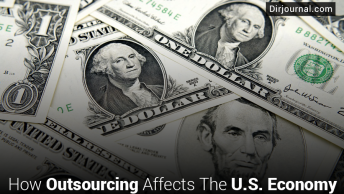Google, Intel, General Electric and Hewlett-Packard may lose tax credits and be forced to pony up more in the form of tax dollars to Uncle Sam.
If you’re wondering what these companies have in common – they all have operations outside of the United States. Barack Obama reiterated in no uncertain terms that there will be no tax breaks for companies creating jobs outside US.
Recently, at a White House meeting that was meant to reveal the tax reforms to ensure American multinationals start paying corporate taxes and keep jobs within the US, President Obama spoke strongly about the existing US system, giving the example of India. He said, it encourages paying “lower taxes if you create a job in Bangalore, India, than if you create one in Buffalo, New York.”
Under the existing US tax code, American companies with subsidiaries in foreign countries, do not have to pay US taxes on the profits from their subsidiaries until the time when money is transferred back to the US. As long as the money earned is put back into the foreign subsidiaries, they can avoid paying taxes and US businesses take advantage of this “loophole” as many call it, in the tax code. This means creating more jobs in other countries where the subsidiaries exist.
The change in plan, revealed by Obama is to prevent US firms from enjoying foreign tax credits on income that is not subject to US taxes. Also the firms that are now able to shift income legally from one foreign subsidiary to another, to avoid taxes, cannot do so anymore.
According to Obama, the existing tax code acts as an incentive for US companies to invest overseas instead of providing jobs within the US. The government hopes to raise $210 billion in tax revenue in ten years, with the implementation of the new plan.
Under the new plan, US companies with foreign subsidiaries will lose all tax credits and will be have to cough up more tax.
Obama said during the White House announcement, “I want to see our companies remain the most competitive in the world. But the way to make sure that happens is not to reward our companies for moving jobs off our shores or transferring profits to overseas tax havens.”
Experts say that a wide-range of companies will be impacted by the changes, from banking institutions to hedge funds, from technology companies to pharmaceuticals.
Drew Lyon, a principal at PricewaterhouseCoopers’ Washington office who is a tax policy advisor for Fortune 500 companies says, “It’s really hitting most Fortune 100 companies that depend to a great deal on growth of foreign markets for growing their total earnings. About half of multinationals companies’ income is earned abroad.”
Proponents of these tax changes say that they have also been expecting the top U.S. corporate tax rate to be reduced, since most other countries have lower corporate tax rates. They feel that foreign tax credit changes alone will most likely be a discouragement for companies to invest in the US. There also has to be a reduction in corporate rate, which would help create jobs in the United States because then there would not be a huge advantage for businesses to move to countries that are tax friendly.
Tax policy experts agree with this and say that these measures, unless accompanied by a reduction in the corporate tax rate, will only have the opposite effect of companies moving their operations, as well as jobs, overseas to more tax friendly countries.
Opponents within the Obama government and several business groups have already started lobbying against this to kill any attempts at increasing taxes on overseas profits. They say that such a move would only make American companies less competitive.
Foreign companies are not really worried with this stance taken by the President and heave a sigh of relief. This is because these tax proposals have nothing to do with off shoring or outsourcing. They say that the proposals appear to be aimed at addressing the tax rate differentials that exist across the world. It will impact only American headquartered companies with operations overseas.
Several analyst firms in the US are of the opinion that it is shortsighted to think that outsourcing is reversible and cutting tax breaks will help in the creation of jobs in the US. They feel that the consequences of such a move engulfing different countries can be larger than the current recessionary scenario.













Some companies are working to move back some jobs from offshore (AT&T) or Wal-Mart creating new jobs for US Citizens. I lost my job last month, I work 4 years for a company that are in a good sector of the economy but still moving hundres of jobs to increase earnings, at least will stop until the economy recovers.
It is understandable to look for ways to increase profits from the corporations’ point of view, but at what cost? Obviously U.S. governments and corporations knew about the consequences of their actions by allowing the outsourcing of jobs to other countries. I ask, what was their objective?, probably something like this: Let’s produce cheaper goods and bring them to the U.S. market where consumerism is among the highest in the world, or at least while consumers in the U.S. still have money and willingness to buy.
Many U.S. companies with operations overseas producing their goods at low operations costs are just increasing their inventories because no one is buying them.
Here’s another tax policy that won’t reverse the trend of offshore outsourcing that is the key reason for high unemployment. These U.S. companies could careless of not being given tax breaks, they compensate lack of tax breaks with profit from cheap labor and from all the other incentives they derive offshore. The trend in offshore outsourcing will not be curbed until global wage meets up with that of developed countries. As developing countries produce more educated and highly skilled worker, agitation for comparable wage will spurn a revolt that will result in equitable global wages. It’s only a matter of time, before US companies begin to bring back their subsidiary companies back to the US, as the dividend of cheap labor can no longer be derived. Until then, the trend of offshoring outsourcing will remain irreversible.
I sell on ebay world wide. we need fair trade to fix this.
This is a fact:
ALL country’s tax their imports except one country USA!
Mexico charged 20% custom taxes of USA made goods prior to NAFTA After NAFTA they took away the custom taxes now they charge 20% VAT Same tax different words! Brazil charges 100% of item & S&H! So something that costs $100 + $25 S&H actually costs them $250?? Brazil can’t pay these prices! Now they want to expand the NAFTA “success” to South America?? Tip: Want to go the Brazil for free? Load your suit case with American Cosmetics (they love them) We sent Billions to Brazil so they can drill for oil to be sold to China Now China sens containers full of product but we send back empty containers. China can’t afford our goods either because of their import taxes.
Prior to Word War II the USA did not do income taxes. It was ran off of Excise Tax on booze land sales & import taxes. These extra income taxes were to be temporary to fund the war. Some think there is USA import taxes now but check for yourself! Ask your old time letter carrier if they EVER collected them! Ask your FedEx UPS driver if they EVER collected them. THE ANSWER WILL BE ALWAYS NO!! Virtually ever other country in the world does collect them. NOT HERE!! Pass to word on!
Some say we can’t do import taxes it will raise prices. This may be true. But higher taxes to pay the cost for the unemployed does too. And what good is a low price if your out of work & can’t pay it?? If Brazil wants to charge 100% tax for our goods & S&H, let us do it on theirs! If Mexico wants to charge 20% for our stuff let get rid of the non-working NAFTA & start charging 20% on their stuff. Lets do the same tit for tat on all the other country’s. First reaction you will get from them “HEY wait! lets talk about it this! it will put our people out of work!” Our response, “lets do! Reduce your import taxes & we will do likewise”
If your a guy who want’s to manufacture a product, common since you want to do it where you will turn the most profit. You make it where you have less taxes & labor. Where a large part of tax revenue is from imports and the labor is less because people are not taxed much. You have heard many times in these country’s how money gos much further.is one reason why people there are paid less & taxes are low.
So they have already exported most of the jobs outside the USA because of NO IMPORT TAXES. Now they want to export USA based company’s that have earnings outside the USA too? What will they think of next?
PLEASE investigate what is said here & pass the word on. I see everyday how come we have lost jobs. I’m not a economist or a elected official. WHY CAN”T THEY FIGURE THIS PROBLEM OUT?? And even talk about this solution??
Absolutely agree here bob, before I continue I have to say I’m an Englishman and not an American, but I follow the USA with great interest as England , Britian has the same problem, where a privilege few have shut shut down home industries to look for more personal wealth abroad, at the loss of jobs, a devaluation of communities, povety, all leading to assorts of domestic problems, we won’t go there right now, but I have to say there has to be a basic right of employment for the man or women of any country before that money and employment is taken away off shore to the benefit of another country and those few privilege wealthy elite and in the process those few become wealthy and the average boys and girls at home become poorer,
I absolutely agree with President Obarma these guys should get no breaks, but more so I believe a register would be of interest to see who these people are and who they support, it would be good see our Prime Minister take a similar tact, and look after Britian, home comes first, There must be some sense of parity, and the excessive greed by those few must be held accountable.